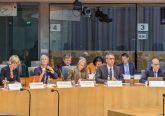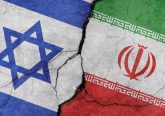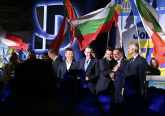
Since mid-July Israel has been going through a season of turmoil and protest. Most significantly, here, unlike both the Arab Spring movements and the London riots, there has been a violence-free protest. It all began when a young woman, Daphni Leef, had to leave her flat so that her landlord’s son could move in instead. Instead of looking for a new flat, she moved to a tent in Tel Aviv’s main street, ironically named ‘Rothschield Boulevard’. Ms Leef’s protest was not only her own: soon her tent was joined by many others who also wished to protest against the high cost of living in Tel Aviv. Within three weeks the protest swept the entire country. In as many as 3,000 tents around Israel, people are protesting against the capitalist system, and calling for better welfare policy and government investment in education, social housing and healthcare. On Sunday, 7 August 2011, 300,000 people came to the main demonstration of the ‘tent movement’ in Tel Aviv. The unexpected success of the protest forced the Prime Minister Netanyahu to ‘change his viewpoint’ on social and economic policy, and to take the protesters’ demands into account. A new political and professional committee has been formed to review Israel’s welfare policy.
Yet who are the protesters now? This is no longer a private matter concerning just Ms. Leef and her friends. The protests could be seen as a revival of middle class political engagement after decades of self-aware silence. Just a few years ago, a similar protest for social housing led by working-class families ended without any tangible achievements. As the current protest has grown, it has rekindled a desire for change amongst lower-working class citizens, as their daily struggle has finally returned to centre-stage of political debate. A sense of inter-class solidarity is now widely recognized, even if the longevity of this season of protests is still perhaps due to its middle-class backbone. That said, the popular image of the protests is one of the people united against the political and financial elite.
The goals of the protest have unsurprisingly multiplied as new groups and sectors of society have joined the demonstration. Yet the desire for ‘social justice’ as the essence of politics and democracy seems to be at the heart of all of them, coupled with an attack on the perceived ‘swinish capitalism’ which has guided Israel’s economy over the last thirty years. However it is only now, more than four weeks after the beginning of the protests, that the leaders of this protest movement are starting to formulate a clear list of aims to counter those of the government’s team of 40 ministers and political professionals.
Interestingly, this protest movement does not seem to be drawing inspiration from a purely left-wing or right-wing agenda; although it is the ‘founding fathers’ of the Israeli right that are frequently quoted and praised (perhaps nostalgically) rather than the country’s socialist founders. Zeev Jabotinsky, the ideologue of the revisionist movement that later evolved into Likud, is frequently praised as a social leader. Personally, I wonder whether the fact that he had no contact with the actual politics of Israel itself (he died in 1940) has helped to maintain his idealized image as a non-socialist social leader. The later leaders who actually shaped Israel’s social policy tend not to be so fondly remembered, with the possible exception of Ben Gurion, a socialist, Israel’s first Prime Minister, and a particularly ascetic figure. Perhaps the lack of praise for today’s leftist leaders is due to the fact that most of them seem to be so far from the hermitic standards of the mythical Ben Gurion, and live instead in luxurious skyscrapers and villas that seem to symbolize everything that is being protested against.
It seems to me that the current call for ‘social justice’ is not so much related to any specific leftist policy as much as an appeal for the basic values of democracy. The dividing line in these protests does not seem to be between ‘right’ and ‘left’, but between ‘the people’ and ‘the politicians’. While the right and left can unite behind the common call for social justice, there is the sense of an unbridgeable abyss between the sincere, hardworking people and the corrupt and hedonistic politicians and tycoons. Even though it seems like a modern class struggle, the notions of left and right seem to have lost their meaning. Perhaps a new ‘third way’ that avoids the over-simplistic definitions of right-wing capitalism and left-wing socialism is needed, because even though the aims of the protest movement would seem to be leaning towards a social-democratic, ‘leftist’ welfare state, a significant number of protesters clearly do not wish to detach themselves from the political right, and are very much opposed to being associated with the left. Perhaps the answer to this conundrum will lie in the key issues and values that define left and right in Israel: the attitude towards the Palestinians in particular and the peace process in general; two topics that seem to remain intentionally excluded from the protest’s agenda.
After experiencing London’s version of social turmoil, the Israeli variant seems to me to be a rather civilized experiment in direct democracy. The protesters approach the police and forces of state power without the use of violence; indeed, there is no violence on either side. The police are treated as compatriots who share the same fate; not opposed, but seen as a silent part of the demonstration. Their families took part in the protest, with special slogans and posters. The ‘tent folk’ have even offered flowers and candy to the police officers.
The protesters freely admit their ignorance of economics and politics. They have drafted a list of demands which is not necessarily based on an in-depth knowledge of economic theory, but is rooted in personal experience of life in hard economic times. And their aims reflect a desire for their political leaders to take these experiences on board. Having said this, it would not be fair to say that these aims are necessarily rooted in the experience of the society as a whole; their vision does seem to have been developed around the specific experience of the educated middle class. Many slogans are highly sophisticated, adopting witty puns to communicate their anti-capitalist criticism. Yet, if protest movement leaders do have a mandate it is based on the movement’s transparent, ‘open-source’ approach: by inviting many people to participate, the protest expects the protesters’ individual experience to serve the public good.
From an early nucleus of friends, the initial protest grew spontaneously into a popular movement organized by a network of ‘popular assemblies’. The assemblies are located in the different geographical centers of the protest, and function by a system of direct democracy. Through daily meetings, all the inhabitants of the local ‘tents neighborhoods’ vote on policy and elect their representatives for the higher national assembly. The national assembly drafted the list of demands to the government, and its members appear often on national broadcasts. This high level of participation in political affairs is not typical for a country where the declining voting rate in the national elections stands at 65% (2009). Interestingly, Israel is a highly politicized state, where citizens express great contempt for institutional politics and its politicians.
I think that the protests represent a wake-up call for Israeli social and economic policy-makers, underlining a popular demand for distributive justice enhanced by stronger state intervention in the economy. Yet this wave of protests is also curiously detached from issues of foreign policy, and in particular from the impact of the Israeli presence in the West Bank on the state’s economy and on the distribution of its resources. As Israeli-Arabs protesters have frequently commented, the call for justice cannot ignore the lack of it in areas so geographically close to where the protests are taking place. This apparent political awakening of the Israeli people and its new call for an alternative social order does not seem to be accompanied by an understanding of the wider political, economic and social situation of modern Israel.
The expected Palestinian independence declaration in September is being seen by some, such as Avigdor Lieberman (Deputy Prime Minister and Minister of Foreign Affairs), as a cause for Israeli society to be very fearful. But rather than fearing the unknown future, the Israeli people, recently reunited by welfare claims, should find the courage to tie together Israel’s internal socio-economic contradictions, and the seemingly never-ending political conflict that surrounds the country. Many protesters are proud that this movement goes beyond partisan right and left politics, yet it remains to be seen whether a change can be accomplished without a deep engagement with the central issues of Israeli politics today.
Or Rosenboim is a doctoral candidate in Politics and International Studies at the University of Cambridge.







1 Comment
The government in control of Israel citizens are trying very hard to make these citizen uprisings appear little more that a ‘Cost of Living’ issue, however this government (ruling minority) has literally used these common citizens in a Apartheid Policy ongoing from early-mid 1900’s.
At this minority ruling class used these Apartheid methods to cause Palestinian ‘Blow Back’ costing many lives on both sides, it has become clear this deliberate policy is to keep both Israeli and Palestinian destabelized enabling enriching the wealth and power of the few while all others suffer or are killed.
This ruling-class government may try to spread false reports that citizen’s are angry only because of ‘Cost of Living’, but the truth is evident in demonstrations most in America never see, those such as ‘Breaking The Silence’, and as important protest over Aparthied policies against Palestinian. I watched Israeli citizen’s demanding and end to dementia such as done against Aid ships in Int’l waters.